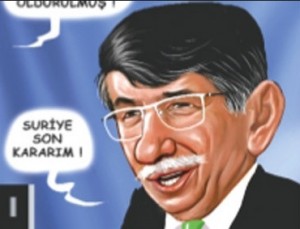Semih Idiz writes: Turkish Prime Minister Ahmet Davutoglu is no stranger to Davos, of course, having attended it last year in his capacity as foreign minister. Now he will be speaking as the prime minister of Turkey, which means it will be the first time Turkey is represented at this level at Davos in six years.
A series of policy miscalculations and blunders by Ankara concerning developments in the Arab world have since estranged many Arab regimes and significantly reduced Turkey’s profile as an active player in the region.
All eyes will therefore be on Davutoglu on Jan 24, when he speaks during a private session, to see if he brings anything new to the table at Davos.
Davutoglu will have the added responsibility of speaking as the prime minister of a country that holds the current presidency of the G-20 group, comprising the 20 largest economies in the world. It remains an open question, however, whether he can say anything new when he is laboring in the shadow of Erdogan, who is setting the tone for Turkey’s foreign policy.
Erdogan appears determined in his hard-line positions on Syria, Egypt and Israel, not to mention his generally anti-Western narrative.
It is unlikely therefore that Davutoglu could go against Erdogan at this stage, even if he wanted to, since this would be damaging for the AKP in an election year.
Davutoglu has little choice but to watch President Abdel Fattah al-Sisi gain international recognition, even though he toppled Morsi in a military coup. Sisi is also listed among the leaders who will attend Davos this year.
What Sisi has to say could end up being much more interesting and relevant to the current situation in the region if Davutoglu fails to go beyond the academic rhetoric we are accustomed to hearing from him.
Davutoglu’s remarks at Davos will nevertheless be studied for any sign that Ankara is seeking a way out of its current international and particularly regional isolation. A recent statement by Deputy Prime Minister Bulent Arinc about the need to improve ties with Egypt, for instance, have been taken as an indication that Ankara is searching for an opportunity to normalize ties with Cairo.
Yasar Yakis, a former AKP deputy and a veteran diplomat who also served as foreign minister in the early years of the AKP government, also went on the record recently to indicate that Turkey has to cooperate with Egypt to attain its targets in the Middle East.
Davutoglu is also aware of this view that has been underlined by a considerable number of Turkish analysts. He is also unlikely to be happy with Turkey’s isolation in the Middle East. This is, after all, the geography that he said only a few years ago with a striking certitude that Turkey would be the key player in.
In addition to this, Davutoglu is also aware that with Qatar bowing to pressure from Saudi Arabia on issues such as support for the Muslim Brotherhood and Hamas, Ankara is likely to end up even more isolated in the region in the future unless it recalibrates its policies according to the facts on the ground. He is not only laboring under the shadow of Erdogan today, but is also trapped by his own rhetoric.
Erdogan’s principle foreign policy adviser has referred to Turkey’s present international isolation as “precious loneliness” in an effort to bring a moralistic rationale to it.
If that is what lies at the core of the “vision” Davutoglu is referring to, then it is obvious he will have little to say anything new in Davos, even if his presence there breaks the ice after Erdogan’s dramatic exit in 2009.

